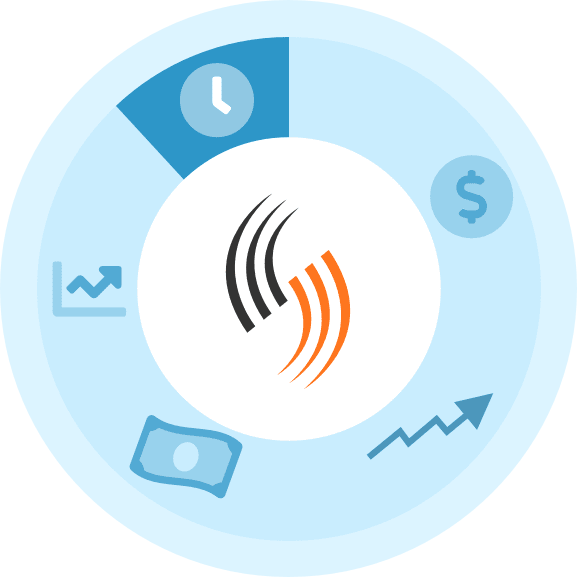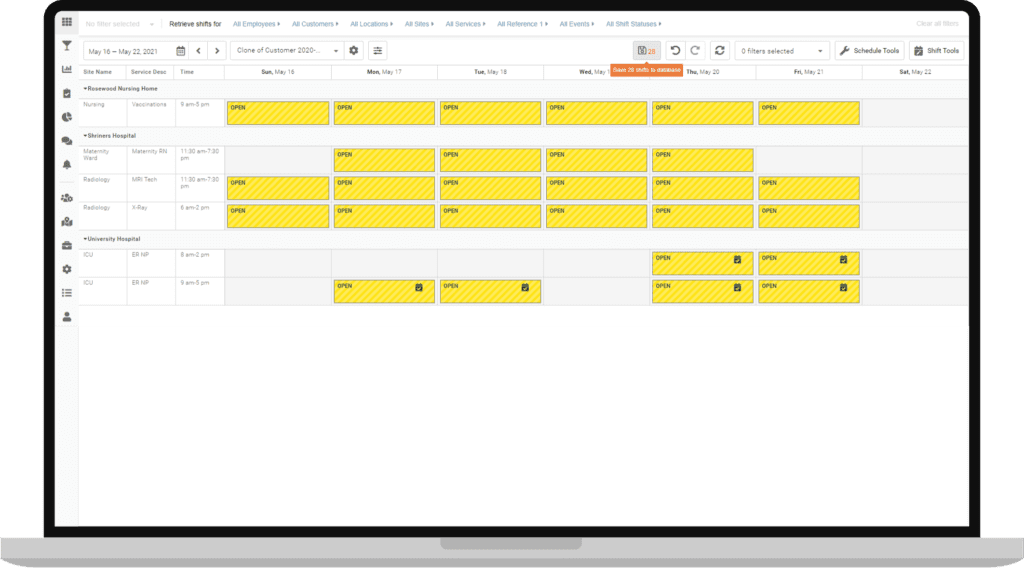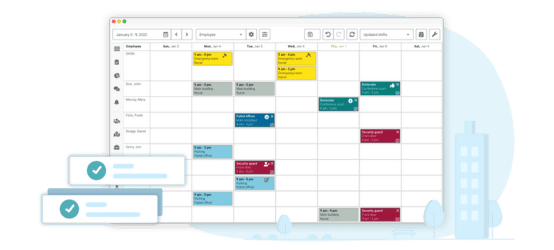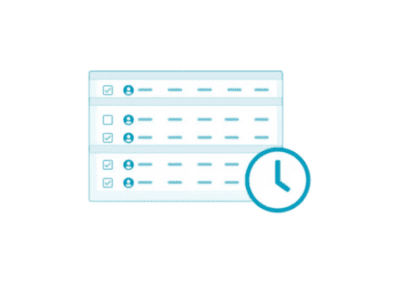As a business owner, manager, or scheduler, you should understand the importance of having an engaged workforce. Unfortunately, engaging your workforce is not an easy task, and certainly cannot be achieved overnight. Building an engaged workforce takes time, consideration, and effort on your behalf, in all areas of your business. One of the main areas that can impact engagement is employee scheduling. Before we delve into how employee scheduling can help build an engaged workforce, let’s take a look at how important employee engagement is.
What is an engaged workforce?
According to Forbes, employee engagement can be defined as the emotional commitment the employee has to the organization.
In other words, an engaged workforce is a group of employees that genuinely care about their work and the company they work for. It goes beyond clocking in, getting a paycheck, and leaving again. Engaged workforces go beyond working for their own gain, and commit to working towards the goals of the organization.

Why is an engaged workforce important?
Yes, having an engaged workforce sounds like something nice to have, but more than that, it impacts many other facets of your business!
Employee Retention
Employee engagement is directly related to employee retention. Poor employee engagement leads to high turnover, which can be extremely costly to your business. According to a recent study, 81% of employees would consider leaving their jobs for the right offer. In other words, they will jump ship when offered the right amount of money. However, an engaged workforce cares more about factors other than money and will be much less likely to leave.
Productivity
As you might have already guessed, an engaged workforce is far more productive than a disengaged one. In fact, Gallup research has shown that companies with high levels of engagement report 22% higher productivity than others. This is easy to believe when we consider our own actions – generally, the more we care about something, the more effort we put into it. The same, of course, applies to an engaged workforce!
There are other benefits of having an engaged workforce, such as improved customer/client satisfaction, enhanced company culture, and lower absenteeism. These benefits should be the priority of any employer, so if improving employee engagement can cause these results, why not invest in it? Employee scheduling is a key area of an organization that can contribute to an engaged workforce, for relatively low costs.
Employee Scheduling Tips/Features to build an Engaged Workforce
Shift scheduling software and other factors around employee scheduling have the potential to transform your workforce, and how engaged they are. Everything from how a schedule is created, to how it is distributed contributes to the level of employee engagement. Let’s break down what you can do as an employer to use employee scheduling to build an engaged workforce.
Invest in Employee Scheduling Software

The first step to improving your employee scheduling process is to invest in the right software for your organization. While some employers view employee scheduling software as a luxury or unessential cost, this doesn’t have to be the case. In fact, Celayix has developed a cost-benefit analyzer to help organizations break down how much money they can save by investing in our software. The calculator breaks down the recoverable expenses from investing in employee scheduling software:
- Excessive time managing schedules
- No-shows, sick calls and absences
- Unbillable overtime
- Payroll Fraud
- Staff turnover
- Payroll/billing errors
With the right employee scheduling software, schedulers have all of the tools and technology that they need to create a schedule that contributes to an engaged workforce. Not only that, but the time saved by the software allows managers to focus their resources elsewhere. This might be spending more time working closely with employees, checking in, providing feedback, or improving other processes.
Involve Employees
Aside from autonomous scheduling, which we will touch on later, it is vital to consult employees about the scheduling process. It would be impossible to build an engaged workforce without knowing what’s important to them. It can help to carry out surveys, seek feedback or hold company-wide meetings to discuss important factors around scheduling. These important factors might include;
- How far in advance do they want to receive their schedule
- Attitudes towards overtime (do they want it, if so, how much?)
- How they want to receive their schedule
- How flexible the schedule is if shifts need to be swapped/dropped
- The order in which shifts should be assigned (seniority, availability, qualifications etc.)
By giving your employees a say in the process of scheduling them, you are already engaging them and allowing them to feel heard. According to Forbes, employees who feel their voice is heard are 4.6 times more likely to feel empowered to perform their best work. Although it might seem unnecessary to involve them in the scheduling process, it has proven long-term benefits. With the right software, schedulers will be able to apply business rules to achieve the considerations of employees and the needs of the business.
AI & Machine Learning
As technology improves, it would be silly to ignore its beneficial applications for employee scheduling. Artificial intelligence and machine learning have the ability to innovate and improve your employee scheduling process. An optimized schedule that suits the needs of the employees will certainly contribute to an engaged workforce. Here at Celayix, we provide easy-to-use AI features in our scheduling software. Not only will this save time for employers and schedulers, but it will actually help you create schedules that suit your workforce. Our AI reviews your scheduling history recognizes patterns (both good and bad) and applies improvements to the schedule based on what it has learned.
Video: Employee Scheduling Tips – Artificial Intelligence as a Scheduling Tool
Take a home healthcare agency for example. If a carer is regularly assigned to a client, the AI will recognize that pattern and continue to schedule that carer for that client wherever possible. This takes the onus off of the scheduler to remember this pattern. The carer will be happy to work with a regular group of clients, allowing them to form routines with them. Not only that, but patient care would improve too.
The same applies to a carer that routinely arrives late to a certain shift/client. The AI will recognize this, and adapt the schedule so as not to assign that carer to that shift. Patterns like this generally occur when the employee has commitments outside of work, such as childcare or even transport issues. More often than not, they will appreciate the change in schedule that results in them being able to arrive to a shift on time.
Flexible Scheduling
Perhaps one of the best ways to build an engaged workforce through scheduling is with flexibility. Echoing back to our previous point, allowing employees to contribute and feel heard is a fast track pass employee engagement. What better way to do this, than by allowing them to build their own work schedule? With the right employee scheduling software, schedulers can utilize flexible scheduling features such as self-scheduling, or shift bidding. While they each have their own benefits and applications, both of them achieve the same goal of giving employees a say in their schedules.
By allowing employees to bid for shifts or self-schedule them, they are more likely to build a schedule that helps them achieve work-life balance. In fact, the Corporate Executive Board (now Gartner), which represents 80% of the Fortune 500 companies, found that employees who believe that they have good work-life balance work 21% harder than those who don’t after researching 50,000 global workers. With improved autonomy over their schedule, employees will be less prone to absenteeism, tardiness, and disengagement.

There are of course other ways to build an engaged workforce, but as far as employee scheduling goes, these tips/features will pave the way. Gone are the days of simply whipping up a schedule and sticking it up on a notice board. If you truly want to achieve the benefits of an engaged workforce, you must invest the time, money and effort to get there. The beauty of investing in employee scheduling software is that the time, money and effort invested in making these changes and using these features is returned ten-fold.





